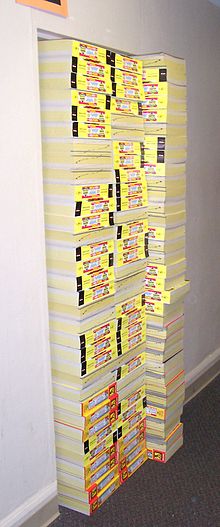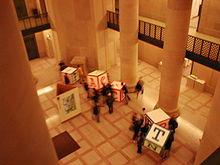- Practical joke
-
 Female Stone louse, appearing in highly reputed German medical dictionary Pschyrembel for 'quite a while'.
Female Stone louse, appearing in highly reputed German medical dictionary Pschyrembel for 'quite a while'.
A practical joke (also known as a prank, gag, or jape) is a mischievous trick played on someone, typically causing the victim to experience embarrassment, indignity, or discomfort. Practical jokes differ from confidence tricks in that the victim finds out, or is let in on the joke, rather than being fooled into handing over money or other valuables. Practical jokes or pranks are typically lighthearted, reversible or non-permanent, and aim to make the victim feel foolish or victimized to a certain degree. However, practical jokes may also involve cruelty.
The term "practical" refers to the fact that the joke consists of someone doing something physical, instead of a verbal or written joke. For example, the joker who is setting up and performing the practical joke, might hang a bucket of water above a doorway and rig the bucket using pulleys such that, when the door opens, the bucket dumps the water. The joker would then wait for the victim to walk through the doorway and be drenched by the bucket of water. Objects can also be used in practical jokes, like fake vomit, chewing gum bugs, exploding cigars, stink bombs and whoopee cushions.
In Western culture, April Fools' Day[1] is a day traditionally dedicated to performing practical jokes.
Contents
Famous practical jokes
The American humorist H. Allen Smith wrote a 320-page book in 1953 called The Compleat Practical Joker (ISBN 0-688-03705-4) that contains many examples of practical jokes. A typical one, recalled as his favorite by the playwright Charles MacArthur, concerns the American painter and bohemian character Waldo Peirce. Peirce was living in Paris in the 1920s and "made a gift of a very big turtle to the woman who was the concierge of his building." The woman doted on the turtle and lavished care on it. A few days later Peirce substituted a somewhat larger turtle for the original one. This continued for some time, with larger and larger turtles being surreptitiously introduced into the woman's apartment. The concierge was beside herself with happiness and displayed her miraculous turtle to the entire neighborhood. Peirce then began to sneak in and replace the turtle with smaller and smaller ones, to her bewildered distress. This was the storyline behind Esio Trot, by Roald Dahl.
Modern and successful pranks often take advantage of the modernization of tools and techniques. In Canada, engineering students have a reputation for annual pranks; at the University of British Columbia these usually involve leaving a Volkswagen beetle in an unexpected location (such as suspended from the Golden Gate Bridge[2] and the Lions Gate Bridge[3]). A similar prank was undertaken by engineering students at Cambridge University, England, where an Austin 7 car was put on top of the Senate House building.[4] Pranks can also adapt to the political context of the era.[5] Students at the Massachusetts Institute of Technology (MIT) are particularly known for their 'hacks'.[6]
Criticism
Not everyone enjoys practical jokes. Robert A. Heinlein once wrote that "A 'practical joker' deserves applause for his wit according to its quality. Bastinado is about right. For exceptional wit one might grant keelhauling. But staking him out on an anthill should be reserved for the very wittiest." [7]
In media
Books
- The Complete Book of Outrageous and Atrocious Practical Jokes by Justin Geste (ISBN 978-0-385-23044-5)
- Cubicle Warfare: 101 Office Traps and Pranks by John Austin (ISBN 978-0-06-143886-8)
- The Complete Practical Joker by H. Allen Smith (ISBN 978-0-89966-931-1)
- The Practical Joker's Handbook by Tim Nyberg (ISBN 978-0-7407-4198-2)
- Prank University: The Ultimate Guide to College's Greatest Tradition by John Austin (ISBN 978-0-307-33843-3)
- Prank the Monkey: The ZUG Book of Pranks by Sir John Hargrave (ISBN 978-0-8065-2780-2)
- Pranks by V. Vale and Andrea Juno (ISBN 978-0-940642-10-2)
- If at All Possible, Involve a Cow: The Book of College Pranks by Neil Steinberg (ISBN 978-0-312078102)
- Nightwork: A History of Hacks and Pranks at MIT by T.F. Peterson (ISBN 0-262-66137-3)
- The Official Handbook of Practical Jokes by Peter Van Der Linden
Movies
- One Hundred Men and a Girl (1937)
- Carrie (1976)
- Porky's (1982)
- April Fool's Day (1986)
- Men at Work (1990)
- Dirty Work (1998)
- Super Troopers (2001)
- Jackass: The Movie (2002)
- Jackass Number Two (2006)
- Jackass 3D (2010)
Radio
- The Howard Stern Show
- The Jerky Boys
- The Phil Hendrie Show
- Rickey Smiley
- Roy D. Mercer
- Touch-Tone Terrorists
- Tube Bar prank calls
TV
- America's Funniest People
- America's Funniest Home Videos
- Beadle's About
- Boiling Points
- Candid Camera
- Crank Yankers
- The Dudesons
- Fonejacker
- Game For A Laugh
- Girls Behaving Badly
- Hi-Jinks
- Howie Do It
- Jackass
- The Jamie Kennedy Experiment
- Joe Millionaire
- Just For Laughs Gags
- Naked Camera
- The Office
- The Office (UK TV series)
- Prank Patrol
- Punk'd
- Rad Girls
- Room 401
- Scare Tactics
- The Tom Green Show
- Trigger Happy TV
- TV Bloopers And Practical Jokes
- What's with Andy?
- Wild Boys
Famous practical jokers
Real people
Some notable people have developed reputations as pranksters in addition to their career accomplishments, or in some cases have made pranking their primary work. Some "full-time" pranksters are comedians or entertainers, while others are more concerned with social activism or protest movements.
People listed below as "pranksters" seem to spend most of their "working day" planning or perpetrating practical jokes, whereas others listed below have careers not otherwise related to pranking.
- Alan Abel — prankster, satirist
- Alladin Bahnick - prankster, personality
- Jeremy Beadle — British television personality
- Jello Biafra — musician, political activist
- Cyrus Broacha — Indian comedian
- George Clooney — film actor
- The Diggers — social activist group, originated Free Stores in the 1960s
- Richard Feynman — Nobel prize winning physicist
- Allen Funt — producer of television show Candid Camera
- Rémi Gaillard — French humorist, prankster
- George Gamow — physicist, science writer
- Mel Gibson — film actor
- Tom Green — actor, comedian
- Abbie Hoffman — political activist, leader of the Yippies, writer
- Andy Kaufman — comedian
- Ken Kesey — writer, organized Merry Pranksters group
- Tom Mabe — comedian
- monochrom — German artist/satirical/hacktivist group
- Keith Moon — rock band musician
- Jim Moran — publicist, publicity stunt promoter
- Camille Paglia — feminist writer, teacher
- Sean Penn — film actor
- Penn & Teller — comedians, magicians
- Darren "Whackhead" Simpson — South African radio host, prank caller
- Joey Skaggs — prankster, culture jammer
- Vivian Stanshall — English singer-songwriter, eccentric, worked with Bonzo Dog Doo-Dah Band
- Carl Dean "Alfalfa" Switzer — child actor
- Hugh Troy — painter, Cornell student prankster
- The Yes Men — pranksters, satirists of corporate behavior
- Darryl F. Zanuck — film producer and director
- Anton LaVey — Occultist and writer
Fictional characters
- Francine Carruthers, Manny Spamboni, Danny Rebus, Annie Scrambler, and Gilda Flip on The Electric Company
- Al Bundy, on Married... with Children
- Andy (Just books)
- Tim Canterbury, on BBC's sitcom The Office
- David Brent, on BBC's sitcom The Office
- The Comedian (Watchmen)
- Sheldon Cooper, on Big Bang Theory
- Jim Halpert, on the US sitcom The Office
- BJ Hunnicutt, on MASH
- The Joker, the DC Comics supervillain
- Valentina La Paz, on The Sopranos
- Emil i Lönneberga, the title character of Astrid Lindgren's fictional children's novels
- Trapper John McIntyre, on MASH
- Hawkeye Pierce, on MASH
- Prankster (comics), the DC Comics supervillain
- Bart Simpson, on The Simpsons
- Naruto Uzumaki, the main protagonist and titular character of Masashi Kishimoto's anime and manga franchise
See also
- April Fools' Day
- Dreadnought hoax
- Gag name
- Merry Pranksters
- Pieing
- Pranknet
- Prank call
- School prank
- Senior prank
- Snipe hunt
- Student prank
- The Yes Men
- Yippies
References
- ^ "Japes of the great (book review of April is the cruellest month: The history and meaning of All Fools' Day}". The Economist. http://www.economist.com/node/2536027. Retrieved 2011-04-18.
- ^ Curiel, Jonathan. "Beetle Overboard! / VW hung off GG Bridge in prank", San Francisco Chronicle, February 5, 2001, accessed March 9, 2011
- ^ Wood, Graeme. "UBC dean says punishment uncertain for botched Volkswagen Beetle stunt", The Vancouver Sun, February 5, 2009, accessed March 9, 2011
- ^ From Hermes to bonsai kittens. What makes a jape great?, from The Economist, December 20, 2005. Discusses the origins and evolution of pranks.
- ^ Priceless pranks, from The Economist, February 21, 2006. Lists famous and successful pranks throughout history.
- ^ Kravets, David. "April 1, 1998: Disney to Buy MIT for $6.9 Billion" Wired, March 31, 2010, accessed March 10, 2011.
- ^ Heinlein, Robert A. "Time Enough For Love". Ace edition, 1988, pg. 351
Categories:- Practical jokes
- Entertainment
- Humor
- Comedy
- Hobbies
- Jokes
- Clowning
- Television genres
Wikimedia Foundation. 2010.



